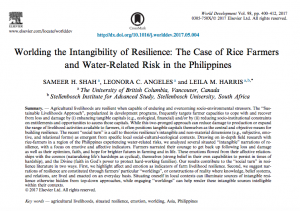
S. Shah, L. Angeles, and L. Harris have recently published an article in World Development on the “social turn” of resilience, using the case of rice farmers in the Philippines.
Summary: Agricultural livelihoods are resilient when capable of enduring and overcoming socio-environmental stressors. The “Sustainable Livelihoods Approach”, popularized in development programs, frequently targets farmer capacities to cope with and recover from loss and damage by (i) enhancing tangible capitals (e.g., ecological, financial) and/or by (ii) reducing socio-institutional constraints on entitlements and opportunities to access those capitals. While this two-pronged approach can reduce damage to production or expand the range of livelihood activities available to farmers, it often positions tangible capitals themselves as the central and objective means for building resilience. The recent “social turn” is a call to theorize resilience’s intangible and non-material dimensions (e.g., subjective, emotive, and relational forms) as emergent from specific local social-cultural-ecological contexts. Drawing on in-depth field research with rice-farmers in a region of the Philippines experiencing water-related risks, we analyzed several situated “intangible” narrations of resilience, with a focus on emotive and affective indicators. Farmers narrated their courage to get back up following loss and damage as well as their optimism, faith, and hope for brighter futures in farming and in life. These emotions flowed from their affective relationships with the cosmos (naturalizing life’s hardships as cyclical), themselves (strong belief in their own capabilities to persist in times of hardship), and the Divine (faith in God’s power to protect hard-working families). Our results contribute to the “social turn” in resilience literature in two ways. First, we highlight affect and emotion as indicators of farm livelihood resilience. Second, we suggest narrations of resilience are constituted through farmers’ particular “worldings”, or constructions of reality where knowledge, belief systems, and relations, are lived and enacted on an everyday basis. Situating oneself in local contexts can illuminate sources of intangible resilience otherwise hidden from top-down approaches, while engaging “worldings” can help render these intangible sources intelligible within their contexts.
Read the article here.